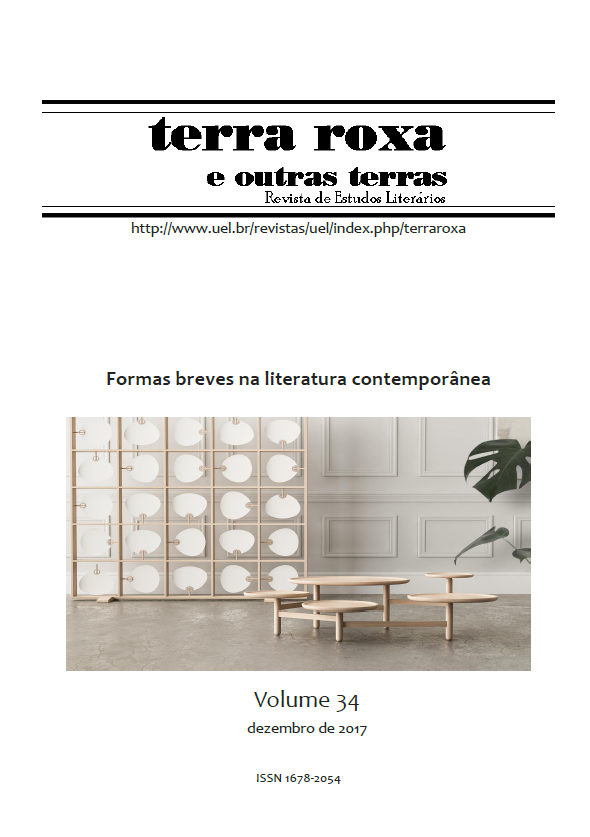Three verses and one coda: the haiku mutation in Brazil
DOI:
https://doi.org/10.5433/1678-2054.2017v34p66Keywords:
Haiku, Guilherme de Almeida, Olga Savary, Paulo LeminskiAbstract
This paper proposes to show some experimentation on Brazilian literature during the XX century, especially the poetry which had a relationship with the Japanese poetic tradition. The methodology that we adopted is the bibliographic research. The authors who subsidize our study will be: Paulo Franchetti, H. Masuda Goga, Paulo Leminski, Roland Barthes, Haruo Shirane e Teruko Oda. The focus of our investigation is on the poems of Guilherme de Almeida, Olga Savary and Paulo Leminski who related and maintained the poetical effects and techniques of traditional haiku. So, by the approaches on the traditional haiku, we will point some configurations which was helped these poets to create new forms for Brazilian haiku. On our analysis, we detached the metrics schemes and the elite moment by Guilherme de Almeida, the dialog of Paulo Leminski with the Matsuo Basho’s aesthetic procedures, that produces the haiku effect on Portuguese language, and the addition of a fourth verse on the Olga Savary’s poems to extend the effect of haiku on the language.Downloads
References
BARTHES, Roland. A preparação do romance. São Paulo: Martins Fontes, 2005.
BLYTH, Reginald Horace. Haiku - Spring. Tokyo: The Hokuseido Press, 1981.
CAMPOS, Haroldo de. A arte no horizonte do provável. São Paulo: Perspectiva, 1972.
FRANCHETTI, Paulo. Dois momentos na história do haicai no Brasil. Anais do IV Encontro nacional de professores universitários de língua, literatura e cultura japonesa, São Paulo, vol. IV, p. 157 – 167, 1994.
FRANCHETTI, Paulo, Elza Doi e Luiz Dantas, orgs. Haikai. Campinas: Editora da UNICAMP, 1996.
GOGA, Masuda. O haicai no Brasil. São Paulo: Oriento, 1988.
GUTILLA, Rodolfo Witzig, org. Haicai. São Paulo: Companhia das Letras, 2009.
LOBATO, Monteiro. Literatura do Minarete. Rio de Janeiro: Globo, 2009.
LEMINSKI, Paulo. Bashô. São Paulo: Brasiliense, 1984.
MARQUES, Fabrício. Guilherme de Almeida e o lugar do haicai na poesia brasileira. Disponível em: http://www.seer.ufal.br/index.php/revistaleitura/article/view/245/167. Acesso em: 6/08/ 2015.
ODA, Teruko, Janelas e tempo. São Paulo: Escrituras, 2003.
SAVARY, Olga. Haikais. São Paulo: Roswitha Kempf, 1986.
SHIRANE, Haruo. Traces of Dreams. Palo Alto: Stanford University Press, 1998.
UEDA, Makoto. Matsuo Bashō. New York: Kodansha, 1982.
Downloads
Published
How to Cite
Issue
Section
License
Authors who publish in this journal agree to the following terms:
a) The authors retain the copyright and grant the journal the right of first publication, the work being simultaneously licensed under the Creative Commons Attribution-NonCommercial 4.0 International License, allowing the sharing of the work with acknowledgment of the authorship of the work and initial publication in this journal.
b) Authors are authorized to assume additional contracts separately, for non-exclusive distribution of the version of the work published in this journal (eg, publish in an institutional repository or as a book chapter), with acknowledgment of authorship and initial publication in this journal.
c) Authors are allowed and encouraged to publish and distribute their work online (e.g. in institutional repositories or on their personal page) after the editorial process, as this can generate productive changes as well as increase impact and citation of the published work (See The Effect of Open Access).
d) The authors of the approved works authorize the journal to, after publication, transfer their content for reproduction in content indexers, virtual libraries and the like.
e) The authors assume that the texts submitted for publication are of their original creation, taking full responsibility for their content in case of any objection by third parties.



















